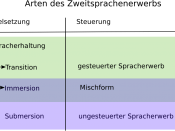Nurhafizah Abd. Kadir, MARA University of Technology
How far can social distance explain variation in the degree of success in learning a second language?
Learning a second language will not always be a success. The degree of success in learning a second language can be affected by many factors. Kim (2006) stated that Schumann's theory turns to the individual's social surroundings as responsible for the variation in success. Social distance is one of the sociocultural factors that can affect the second language acquisition. Social distance refers to the cognitive and affective relationship of two cultures that come into contact within an individual (Brown, 1994). According to Schumann (1976), he described social distance as pertaining to the individual as a member of social group which is in contact with another social group whose members speak a different language. Social distance is also explained in Schumann's Acculturation Model which explains the acquisition of second language by immigrants.
According to the Schumann's Acculturation Model, Schumann (1978) stated that "the degree to which a learner acculturates to the target language group will control the degree to which he acquires the second language".
Therefore, social distance refers to the distance between the second language learner and the target language group. Schumann also added that the learning conditions of both of the groups may affect their learning process. Thus, if they are learning in a bad learning condition such as the second language learner thinks that their language is more dominant than the target language group, they will feel that there is no need to learn the target language. However, they are learning in a good condition if they believe that there is a need to learn the language. Social distance is also affected by many factors such as the equality of L1 and L2 groups,


